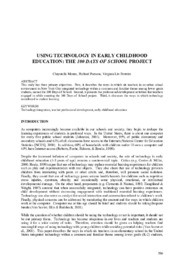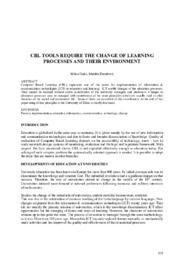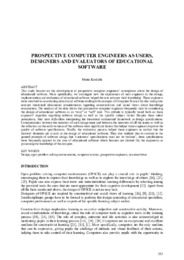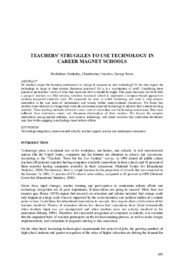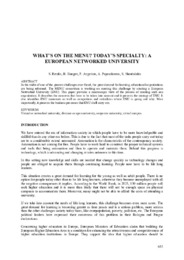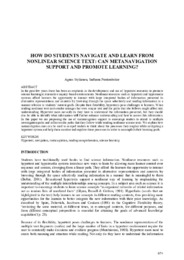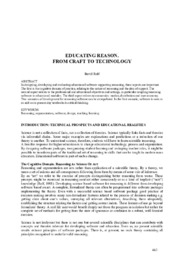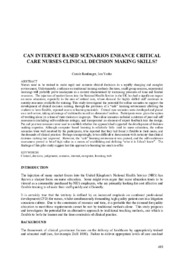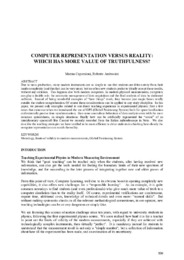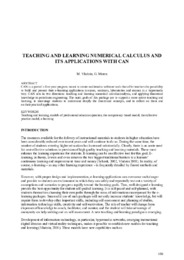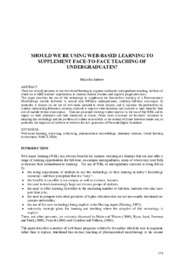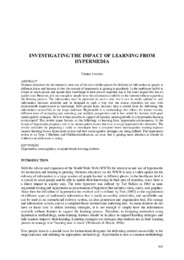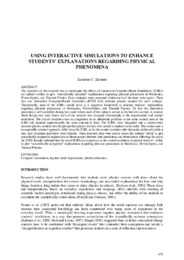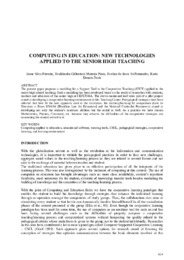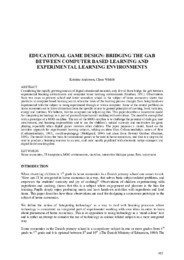Συνέδρια - Conferences: Recent submissions
Αποτελέσματα 141-160 από 502
-
Using technology in early childhood education: the 100 days of school project
(Department of Educational Sciences, University of Cyprus, 2003)This study has three primary objectives. First, it describes the ways in which six teachers in an urban school environment in New York City integrated technology within a common and familiar theme among lower grade students, ... -
Moving from local to global teaching: integrating appropriate technologies – a reflection
(Department of Educational Sciences, University of Cyprus, 2003)There are many reasons why universities and other tertiary education institutes are moving away from providing local (or face-to-face) teaching to global teaching. Our School of Computer and Information Science is one that ... -
CBL tools require the change of learning processes and their environment
(Department of Educational Sciences, University of Cyprus, 2003)Computer Based Learning (CBL) represents one of the terms for implementation of information & communication technologies (ICT) in education and learning. ICT enable changes of the education processes. They cannot be realized ... -
Simulations, applets and learning in schools
(Department of Educational Sciences, University of Cyprus, 2003)This paper reviews the problem of establishing learning effects with computer simulation packages in science teaching. It is stated that evidence is accumulating about the effects of simulations in a laboratory environment ... -
Prospective computer engineers as users, designers and evaluators of educational software
(Department of Educational Sciences, University of Cyprus, 2003)This study focuses on the development of prospective computer engineers’ conceptions about the design of educational software. More specifically, we investigate how the experiences of such engineers in the design, ... -
Teachers’ struggles to use technology in career magnet schools
(Department of Educational Sciences, University of Cyprus, 2003)Do teachers expect the learning environment to change in response to new technology? Or do they expect the technology to adapt to their routine classroom practices? Or is it a combination of both? Underlying these questions ... -
What’s on the menu? Today’s specialty: a European networked university
(Department of Educational Sciences, University of Cyprus, 2003)In the midst of one of the greatest challenges ever faced, the great demand for learning, educational organizations are being reformed. The MENU consortium is working on meeting this challenge by creating a European Networked ... -
How do students navigate and learn from nonlinear science text: can metanavigation support and promote learning?
(Department of Educational Sciences, University of Cyprus, 2003)In the past few years there has been an emphasis in the development and use of hypertext resources to promote science learning in interactive inquiry-based environments. Nonlinear resources such as hypertext and hypermedia ... -
Educating reason. From craft to technology
(Department of Educational Sciences, University of Cyprus, 2003)In designing, developing and evaluating educational software supporting reasoning, three aspects are important. The first is the cognitive domain of practice, relating to the nature of reasoning and the idea of support. ... -
Can internet based scenarios enhance critical Care nurses clinical decision making skills?
(Department of Educational Sciences, University of Cyprus, 2003)Nurses need to be trained to make rapid and accurate clinical decisions in a rapidly changing and complex environment. Unfortunately, a reliance on traditional training methods (lectures, small group sessions, experiential ... -
Exploiting internet & multimedia technologies to advance educational process
(Department of Educational Sciences, University of Cyprus, 2003)Internet technologies and multimedia applications are becoming the new trend in educational process. The number of schools, universities and other educational institutions that intend to adopt computer-based learning is ... -
ICT in science teaching Investigating the spreadsheets integration Into science teaching to promote both curriculum aims and science skills via ict strands
(Department of Educational Sciences, University of Cyprus, 2003)Spreadsheets can be implemented into Science teaching as learning tools. The issue is that whether such ICT integration (Spreadsheets) into science teaching can facilitate both the: a) Promotion of specific curriculum aims ... -
Computer representation versus reality: which has more value of truthfulness?
(Department of Educational Sciences, University of Cyprus, 2003)Due to mass production, many modern instruments are so simple to use that students are driven away from their inside complexity (and this fact can be very nice); but too often now students prefer to blindly accept those ... -
Teaching and learning numerical calculus and Its applications with can
(Department of Educational Sciences, University of Cyprus, 2003)CAN is a part of a five-year program meant to create multimedia software tools that offer teachers the possibility to build and present their e-learning applications (courses, seminars, laboratories and exams) in a hypermedia ... -
Should we be using web-based learning to supplement face-to-face teaching of undergraduates?
(Department of Educational Sciences, University of Cyprus, 2003)There are several pressures to use web-based learning to augment traditional undergraduate teaching, not least of which are to fulfil students’ expectations, to increase student retention and improve progression rates. ... -
Investigating the impact of learning from hypermedia
(Department of Educational Sciences, University of Cyprus, 2003)Distance education via the internet is now one of the most viable options for delivery of information to people in different places and because of this the concept of hypermedia is gaining in popularity. In the healthcare ... -
Using interactive simulations to enhance Students’ explanations regarding physical Phenomena
(Department of Educational Sciences, University of Cyprus, 2003)The objective of this research was to investigate the effects of Interactive Computer-Based Simulations (ICBSs) on student’s ability to give “scientifically accepted” explanations regarding physical phenomena in Mechanics, ... -
On the cognitive transfer in CBL environments
(Department of Educational Sciences, University of Cyprus, 2003)In this paper we report on a longitudinal study of a Leonardo da Vinci program about the application of a Computer Based Learning environment in three EU countries, Greece, Germany, and the Netherlands. Firstly we clarify ... -
Computing in education: new technologies applied to the senior high teaching
(Department of Educational Sciences, University of Cyprus, 2003)The present paper proposes a modeling for a Support Tool to the Cooperative Teaching (STCT) applied to the senior high school teaching. Such a modeling has been developed based on the result of researches with students, ... -
Educational game design: bridging the gab between computer based learning and experimental learning environments
(Department of Educational Sciences, University of Cyprus, 2003)Considering the rapidly growing amount of digital educational materials only few of them bridge the gab between experimental learning environments and computer based learning environments (Gardner, 1991). Observations from ...
